 Untitled Document
Untitled Document
Interviews
Deep
Purple
Roger Glover Part
1
Machine Head goes Bananas over
America Part 2
"If
it feels right, we do it" Part 3
"Change
is life"
|

| |
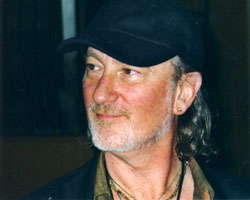
Roger Glover, Hamburg, November 2003.
Photo by Mikael Wiklund |
February 2004 - The last couple of years have seen
Deep Purple go through major changes. First Don Airey took the vacant position
at the keyboards left by founding member Jon Lord in September 2002. Then, for
their new album Bananas, the band decided
to employ an outside producer for the first time since the 70's. In this second
part of his conversation with The Highway Star, Deep Purple bass player Roger
Glover talks about Don Airey's role in Deep Purple, how
Roger would have produced Bananas, jamming in the studio
and the song Haunted The
European "Bananas" shows saw a revitalised Deep Purple. Which factors
have contributed to this new spark?
- Certainly Don coming into the band
has meant a lot to us. Initially he was just filling in for Jon. The first gig
he did with us was at the Skanderborg Festival
near Århus, Denmark in August 2001. He was obviously nervous - he only had
two days to learn it all! But he's got a brilliant mind and I learned then how
brilliant he is. I went up to him after the show and said, "Don, you did
a great job. I am proud of you. Thanks a lot." He said, "Well, for about
20 seconds I tried to play like Jon and then realised that I have to be Don."
I like that. He said exactly the right thing.
I think he has grown into the
role. I think Don spent all his life preparing himself actually, for this moment.
He's never really been in a band. Obviously he's been in lots of bands, but Rainbow
is probably the closest he got to actually become a recognised member - as well
as in Colosseum II of course. But never with this kind of high profile band.
I think he has been too much the session man - the guy that comes in when all
else fails to help out with his brilliance and then disappears again and lets
others reap the glory. I think he is ready for this, but I also think he is a
little bit nervous and apprehensive about it. I think the truth of him is just
shining through and it has been a gradual improvement. How
did Don handle the recording sessions for "Bananas"?
- We have
a writing session and we have a recording session, it's all pretty much the same
thing. But during the process of this, Don was just truly amazed at how relaxed
it all is - but yet how intense. We're there for a reason. It was intense this
time because of Michael Bradford. We needed an outside producer, an outside influence.
During this recording process, this relaxed intense process, Don just blossomed.
He played great on the album. He was interested in different sounds and different
textures. You have so much choice of sounds as a keyboard player and your character
comes out in your choice of sounds.
Don is pretty much a Hammond man. He's
also got this thing in his head about Jon's Hammond sound and has recreated that.
On stage now he has a killer sound! Absolutely killer sound. He is eager and he
is one hundred percent in for it, so that makes a difference. Everyone's really
excited. It's great to be in this band, there are so many good moments on stage
that just blow me away. I'm still a fan of everyone in the band so it couldn't
be better. What are your feelings on Bananas today?
- Well, here we are well into the first year of "Bananas" and I'm very
proud of it. It is a good album for us. There are issues I have with the album,
everyone in the band has, but in general I can't fault it from a sonic point of
view. I'd prefer different mixes on a few songs but that's another matter. I would
always do that, even on stuff I mixed myself I would prefer to mix it again.
Michael Bradford was exactly what we needed. Strong, intelligent, humorous, diplomatic,
decisive and a great musician and writer too. Not just Don but everyone in the
band has been galvanised by the Bananas process. What does Bananas mean to me?
It's great! I love it! Like I said, the title is just going to be a sound. I don't
think it has a meaning anymore.
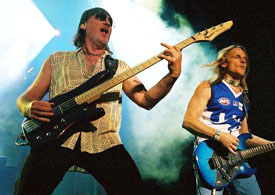
Glover & Steve Morse, Kamenz, Germany, June 15, 2003. Photo by Jirka Rogl
| At a
press conference in Norway last September, Jon
Lord talked about "Bananas". He said he thought you could have done
a better job producing it.
- It's very nice of him to say that, but I
don't think I could have done it. I think I could have mixed some of the songs
a little bit better, at least to my satisfaction. But it's a learning experience,
I learned a lot from Michael Bradford too. I learned that things I instinctively
do aren't necessarily right because it's my instinct.
When we start thinking
of Jon's version of what I would have done with the album, I start thinking about
what I would have done with the album. One of the things I would have done would
be to not stop at twelve tracks. I wanted to carry on, because jamming is a big
part of this band.
There was a black and white distinction between the writing
session for this album and the recording session. The writing session was a lot
of jamming going on, out of which we got various songs. The recording session
was those songs. What I wanted to do was doing more jams in the studio.
Just
give me 24 hours, just 24 hours. Just sit and let Steve and Paicey wail away for
half an hour. How about Don and Steve wail away for half an hour. How about all
of us play some blues, play anything, play some riffs. Then you've got a whole
bunch of stuff on tape that you can use. Pro Tools is a device that I wholeheartedly
use and agree with. It makes life a lot easier than cutting up bits of tape with
a razor blade, which is the only other way to do it.
I know we would have
done at least another couple of days recording. But all of a sudden - bang, it
was over, that's it, the album's finished. "But, but, but…." -
but I'm not the producer so I had no say in this. I would have had more a long
list of jamming tracks or something like that. Something, I don't know, I can't
think of what it might be, you can't visualise it really. Can you say "visualise"
when you talk about music? Or "aurealise"? Would
there be anything in the jam sessions or older writing sessions that could possibly
have become something?
- Yep! There's several. "Long Time Gone"
is the obvious one that people know about. We never really worked that hard on
it. We could probably improve that a bit. There's a couple of other songs.
There's one that came from a session that Jon, Gillan and I did on our own in
North Devon, which is great. It's... I mean, how can I describe it to you? It's
like describing the Mona Lisa, it's a piece of music. I think it is the basis
of a good song one day. There is at least one other one that we did in Steve's
place that I think is great, and they're in sort of embryo form. Whether we'll
go back to them or whether they'll get forgotten in the thrill of the new songs...
They could get released on some weird compilation in 200 years time… Maybe
they can sit with Purpendicular outtake "The Stallion" somewhere?
- Yes, probably. Well, actually, "The Stallion" can't be got at. It
is owned by the record company and we can't get it back. We're not with that record
company anymore so it's a lost cause. Which is a shame, because it is a brilliant
riff. It's finished but I never liked the middle eight. That, to me, is unfinished.
The middle eight needed to be rewritten. Would
you be allowed to re-record it if you rewrote that part that you didn't like?
- Yeah, I suppose we could in a way. You then re-own it. I don't know, it seems
like slightly going backwards. There's other things to do.
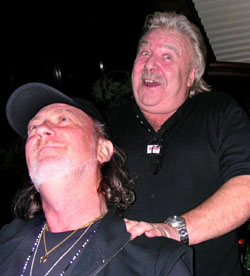 Uriah Heep drummer Lee Kerslake treats Roger to an apparently
much needed shoulder massage after the two bands' show in Århus, Denmark,
November 29, 2003.
Uriah Heep drummer Lee Kerslake treats Roger to an apparently
much needed shoulder massage after the two bands' show in Århus, Denmark,
November 29, 2003.
Photo by Rasmus Heide | When
you started playing which was then known as "Up the wall" on the British
tour in February 2002, you told us there were other new tracks that were even
better. Do you remember which ones you were thinking about?
- That must
have been the ones I just mentioned. We did a session in Greg Rike's Studio, which
produced a couple of demos. Gillan and I went in early and wrote a bunch of bits
and pieces and tried to get the band to… But the band didn't want to know,
for the most part. They either weren't impressed, or they couldn't see past the
folky-sounding two guys and acoustic guitars. There's stuff lying around but there's
a reason for it not to be out, because it is not ready. It's not finished or it's
not good enough, one of the two. But having said that of course, we felt the same
about "Slow Train". We felt the same about "Living Wreck"
at one point. What do you feel about "Slow
Train" now? It sits there as a perfectly OK track with the rest of the Fireball
album.
- So does "Freedom". I love that track. There's
a section in "Slow Train" that reminds me very much of a section on
Rainbow's "Bent Out of Shape".
- It's exactly the same. Ritchie
liked it and we hadn't used it. Or at least it hadn't been released at that time. Earlier
you mentioned how you'd have liked more jamming in the studio. Combining Don Airey's
jazz-rock playing in Colosseum II and Steve's solo stuff with you and Gillan's
song writing makes for an explosive cocktail. Yet on the album, the title track
is the only real example of the potential in those two guys when they take off
instrumentally.
- I remember the moment that was written. It was actually
very funny. I can't remember who started playing it, I think it was Steve, this
frenetic riff, which is in 7/4. Paicey joined in and we all joined in, it was
just… We fell over laughing, "whoa, what a hoot!" And of course,
then realising, "if it's that much of a hoot, let's write a song!" "We
need a chorus, we're already in 7/4, should we go back to 4/4?" I said, "no,
we should go to 5/4!" The first chord that someone went to… I worried
a little bit because it's the same chords as in one of the Spinal Tap songs, "Big
Bottom" I think it is. But of course, it's in 5/4 so we got away with it.
There's a very interesting thing about that chord sequence at the end. Basically
what it does is that it goes through the same chords as in the chorus, so it's
G, F, B flat, C. Then from the C, it goes up a tone to D. So the first four chords
are basically coming from the G, second four chords are coming from the D, so
then it goes D, C, F, G, G, one tone up to the A. So the next one is A, so it
sort of goes up like that. If you started a G anywhere on a piano and then went
up in a scale you could go all the way up through that whole section of chords
and that was a revelation after we'd finished that. It's a mathematical, perfect
thing. In a way, I think that's why we're loathed to mess with it. Because it
seems right the way it is. Would there have been
room for any more of that, I'm thinking more of the second half of the song where
Steve and Don sort of take off for the skies?
- Yeah, I know, I've seen
a few comments about if live, could we make it a bit longer? It's a very concise
chord sequence. I suppose at the end of it we could probably go into a long something
or other and then do the ending again, it's always possible. Some future tour
might see that. It's very jazzy, it's more after
Steve and Don's solo background than it's the Purple background.
- I think
it's got it's place on the album but so has "House of Pain", "Picture
of Innocense", the more brutal sounds. The filter through which ideas pass,
this collective Deep Purple filter, says, "no, that's too much in that direction".
I can't tell you what it is, how we reach that process, it's just an instinctive
feeling. Does it feel right? If it feels right, you do it. If it doesn't feel
right, you don't do it. There are no guidelines, really. "Never a Word"
felt right, so we did it. It doesn't sound anything like Purple, but it felt right.
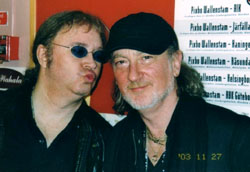
Love thy bass player. | 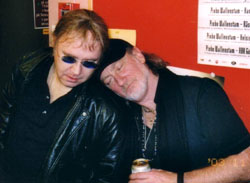
Sleeping on the job? Ian Paice & Glover. Gothenburg, November 2003. Photos
by Mikael Wiklund | The
one track that's probably caused the most discussions, has got to be "Haunted".
Does that also have a special place, good or bad, in the band?
- When
we were doing "Purpendicular" there was a little catch phrase, because
"Purpendicular" was a real awakening, if you like. The catch phrase
was, "there's no such thing as a bad idea". All ideas are well. Throw
them all in the pot.
We got to Los Angeles for the writing session for "Bananas"
and I came with a couple of ideas. One of them was this chord sequence for "Haunted".
To be quite honest, I didn't think the band would like it. I played it first on
acoustic guitar to Michael and Ian Gillan. We went to Michael's little home studio
for a day or two before the rest of the band came in. After we had explored a
couple of different ideas, I finally gathered up enough courage to pick up an
acoustic guitar and say, "I've got this idea."
I basically played
"Haunted" the way it is, except the word "haunted" actually
came a day later, and I had no idea what the tune or the words would be. It was
just a chord sequence. Michael loved it, and Ian Gillan loved it. They said, "yeah,
we got to try that!" OK, there's no such thing as a bad idea.
So, the
rest of the band arrived and after about a week or so of nailing the ones we knew
were going to be obvious and maybe some of the lesser ones, I plucked up enough
courage again to pick up an acoustic guitar and play what is essentially a non-hardrock
song, it's just a song. Anyone could have sung that song, Engelbert even. "Haaaauuunted…"
You can imagine that! They all liked it.
I was really concerned it sounded
too middle of the road, I was trying to fuck it up in some way. I wanted some
kind of weird distorted, heavy, slow, "crrrsssch", something different,
something maybe a bit harder. I worried about it, I thought it was too pretty.
Because I do tend to write too pretty songs. Left to my own devices, the prettiness
comes out.
Of course, as it progressed and we started routineing it, I kept
cajoling with them, "play it slower, play it heavier, play a really mean
guitar". When we actually did it in the studio, it didn't have any of those.
It was just played fairly straight.
Paicey is the absolute master of just
sitting on a groove and just playing nothing, making it work great. That's what
he does best. Right up until the thing was released, I worried that it was just
too non-Purple, but Michael embraced it, he loved it. He is really into radio
and he just thought it was a smash. "We could put this in a film, put this
on radio, anywhere, it's a great song." We were led by that. He put the strings
and vocals on it. We had left by then, it was all him. It works for the song.
Of course, I was as surprised as anyone when the record company said, "it's
the first single". I went, "what?" Maybe they know something I
don't know. Because you don't know what's going to happen next. We had been talking
a lot differently now if "Haunted" had come out and gone straight to
number one, all over Europe. This would be an entirely different conversation.
We'd be staying in better hotels!
It's like when "Black Night" happened.
"Deep Purple In Rock" came out and we'd done the college circuits and
we had proved ourselves live. "Deep Purple In Rock" was a hit but "Black
Night" took us into the stratosphere in Europe. It's amazing what one song
can do. All of a sudden, everyone knows you! Top of the Pops! So, one song can
do it. I think in this day and age of internet piracy and stuff like that and
people getting fed up with paying a lot of money for a CD that's only got one
decent song on it, it's going to come back to songs. It was worth a chance.
It's obviously one of those songs that's going to divide opinion. As most songs
do, actually. It hasn't been number one. I'm not disappointed by that. I think
it's got a great chorus. I've no idea what's going to happen with this album.
It's been very good to us so far but who knows, that may be the peak or it may
go on. It's interesting because a lot of people
have taken to that song, they really love it, and a lot of people are saying they
really, really hate it. But it isn't the most odd song on the album. In a Deep
Purple context "Never a Word" is more odd - but in an experimental way.
It seems like a lot of Deep Purple fans don't mind you trying on new directions.
- Rock is a genre that is capable of expressing things. If we believe this
then we should live up to it. And I think we do. "A Touch Away" is a
very tender song. "The Aviator" is an odd kind of thing. And "Never
a Word". I think we've explored most emotions which is so refreshing because
most bands only have one emotion, and that's anger. I'm fed up with anger. I'm
fed up with negative… I don't know, I'm still living in '67. Approaching
1968?
- Flower power lives! This concludes
part two of The Highway Star's on-going interview series with Roger Glover.
Read
part one Read part three
© The Highway Star 2004
|
|